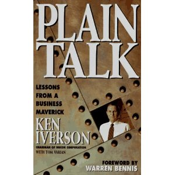WEAVING WITH SYSTEMS SAVVY AT NUCOR
/Nucor is the largest producer of steel in the U.S. and the world's foremost steel recycler. In June of 2010 the Norfolk, Nebraska area, home to four Nucor divisions, was struck by horrible flooding. This is Part 4 of their story and how we can see systems savvy woven into their tightly aligned practices (Part 1, Part 2, Part 3).
The stories at the Vulcraft and Nucor Steel divisions in Norfolk, Nebraska, highlight the value that even deep engineering and production-focused companies can gain from weaving aligned organizational practices into their technology expertise. Ken Iverson, legendary CEO of Nucor, said (in Plain Talk) that his stock reply to "How do you explain your success?" is "It is 70 percent culture and 30 percent technology. The truth is, I'm not sure if it's 80 to 20 or 60 to 40 percent, but I'm certain our culture accounts for more than half of our success as a business." He goes on to say, "Consistency is the name of the game." I'll translate that to be alignment and a tight weaving together of the different dimensions of their organization -- systems savvy.
How Vulcraft and Nucor Steel responded to the flood shows that having the right people in the right organization, with thoughtful practice, is a strong support for technology and engineering achievements. It takes full consideration of technology, organizational practice, and people. Clearly this doesn't happen by accident. Dan Krug, Director of Human Resources at Nucor, helped me understand the overall Nucor approach behind their success. I'd asked him about the role of their famous pay for performance strategy, but he made very clear that pay for performance is no silver bullet:
Pay for performance is very important -- [it gives] responsibility and accountability. Almost any company could do that . . . and some have. But replicating the culture, how people work together and how decisions are made, is more difficult. Unless you select people who are cut from a mold and interested in pushing responsibility down, it won't happen. Most trained managers are not trained to push responsibility down. In our culture responsibility and accountability have to intersect. If not, culture will break apart. For pay for performance to work you have to let people make decisions. Not all people want to [make their own decisions. In many other jobs] they've been paid to just do what they're told. We are good at assessing people: whether you're 22 or 62, [we assess] in terms of the level of responsibility you'll own, whether you trust people, and what you think is possible. The recent college grads that we bring in are humble, confident, hardworking, interested in making a difference, and working with other people in a high performing environment.
Background on pay for performance at Nucor (Ken Iverson, in Plain Talk):
A production baseline is established for groups of twenty to forty people who together perform some complete task. Any production above and beyond that baseline earns each member of the work group bonus pay." If the team finds away to improve their equipment or process, they reap the benefit. An example of how teams tinker and experiment: "They installed a larger motor, fed the angles into the machine in various ways, and so on. Within a year, their production was up to twenty tons an hour, twice that machine's rated capacity." And substantial weekly bonuses were given for increased production.
Google "Nucor Innovation" and you'll find a long list of stories like Ken Iverson's from 1998, or the 2010 flood recovery. Nucor is on the leading edge of steel production and finishing due to the thoughtful and evolved weaving together of their technology, organizational practice, and people. The recent Norfolk flood was just another trigger for them to apply their systems savvy innovation practices. In tomorrow's post I'll share some of Nucor's strategies for developing teammates develop their own systems savvy.







